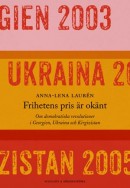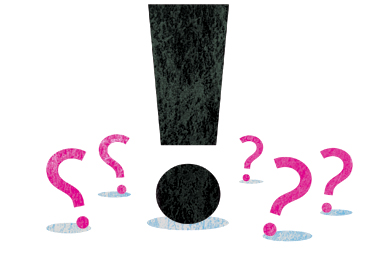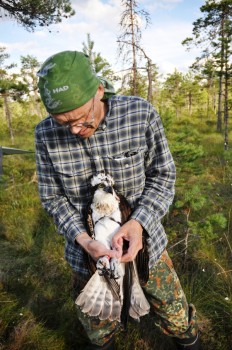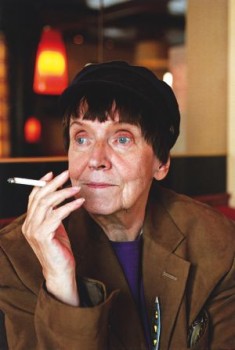Search results for "2010/02/2011/04/2009/10/writing-and-power"
Mother-days
30 June 2006 | Fiction, poetry
Poems from Yhtä juhlaa (‘It’s all a big celebration’, WSOY, 2006)
(a square metre, 3.)
Now for the-kick-of-being-the-good-mum:
after the rye porridge
after the sons washed with camomile foam
and slipped into clean sheets
with mummy singing a sweet song.
Something about shadowed snow
and how at the blue twilit-moment one can
go inwards. If you’re up to looking. All that garbage and slag:
ash from the too-small days, clotted with
non-combustible blots, even though here
the sky’s clear
and the windows open to the winds.
Good grief, here we’re making new people.
But all I’d time for
was the track from the dishcloth to the nappy bin,
and back from the children’s painting-table
to the sink. No job
for spoilt girls, this: the prissiest minx
would soon turn woman in this fix:
kids coming next after next,
years of full-time labour
in a square metre where
you make no point about peccadilloes,
because so much is at stake.
You’re no longer a rose,
pimpinella, rosabella,
but subsoil: loam
and spots of unrottable compost.
A feebler person would have reversed on
the first tantrum;
the child’s learnt to say things
and is saying things
I never thought would come. More…
Anna-Lena Laurén: Frihetens pris är okänt. Om demokratiska revolutioner i Georgien, Ukraina och Kirgizistan [The price of freedom is unknown: On democratic revolutions in Georgia, Ukraine and Kyrgyzstan]
22 November 2013 | Mini reviews, Reviews
 Frihetens pris är okänt. Om demokratiska revolutioner i Georgien, Ukraina och Kirgizistan
Frihetens pris är okänt. Om demokratiska revolutioner i Georgien, Ukraina och Kirgizistan
[The price of freedom is unknown: On democratic revolutions in Georgia, Ukraine and Kyrgyzstan]
Helsinki: Schildts & Söderströms, 2013. 212 pp., ill.
ISBN 978-951-523-227-4
€25, paperback
Finnish edition:
Kuinka kallis vapaus – värivallankumouksista Georgiassa, Ukrainassa ja Kirgisiassa
Suomentanut [Translated into Finnish by] Liisa Ryömä
Helsinki: Teos, 2013. 219 pp., ill.
ISBN 978-951-851-473-5
€28.40, paperback
Anna-Lena Laurén (born 1976) is an award-winning Finland-Swedish journalist, author and Moscow-based foreign correspondent. In this volume of reportage, she investigates three post-Soviet states after their ‘democratic revolutions’, which took place between 2003 and 2005. Georgia, Ukraine and Kyrgyzstan differ from one another in many respects. Georgia has made the most progress along the road to democracy, but even it remains an authoritarian state. Ukraine is plagued by corruption; impoverished Kyrgyzstan – culturally and linguistically divided, like Ukraine – is relatively free, but corruption is rife. For good or ill, these countries are overshadowed by their former ruling power, the present-day nation of Russia. Anna-Lena Laurén has listened with a keen ear to politicians, intellectuals, farmers and workers, as well as members of minority groups. She is well-versed in the history and current situation of these countries and portrays people’s everyday lives with empathy while spotting the green shoots of democracy in among the difficulties.
Translated by Ruth Urbom
The politics of difference
17 June 2011 | Non-fiction, Tales of a journalist

Right or wrong, my country? Illustration: Joonas Väänänen

Right or wrong, my country? Illustration: Joonas Väänänen
Big electoral turnouts are generally considered a good thing. But, writes columnist Jyrki Lehtola, in Finland the fact that the vote went up in the last Finnish general election caused a revelation. Educated urbanites and the media (perhaps near enough the same thing), are shocked by how 20 per cent of their fellow Finns think – and the ramifications caused tremors all across Europe
Listen up. Diversity is a resource. Except of course if it’s the sort of diversity that is a resource for the wrong people.
That sort of diversity isn’t the least bit nice. In Finland in the spring, we ran into the sort of diversity that even got the rest of Europe to start worrying. Out in the thickets and forests, diverse people had been springing up in secret, people of whose existence we urbanites were entirely unaware.
And they threatened to bring Europe down. Europe. Which was a bit much. More…
Nothing but light
30 December 2003 | Fiction, poetry
Prose poems from Huoneiden kirja (‘A book of rooms‘, Otava, 2003)
The ladies’ room
Behind the shining mirror twin girls are squealing, they disappeared inside the walls long ago. They had plaits, red pompons, bad moods – all of them moulded and twisted by wire coathangers from the very start. They gouged the house full of passageways, they hollowed out the paper walls with silver christening-spoons. They disappeared between the stairs on the staircase, saying: evil’s a gateway onto a void with hundreds of gateways inside. Now they’re in this room, behind this mirror. Now the sun’s rising over the firtree-tops, creeping step by step higher towards the overarching sky. Inside us there are two hundred girl-embryos, the girls shout, they’re handicrafts fashioned by themselves like us: out of pearls, blood, splinters of mirror, it’s these we were made of. If you don’t find us, you’ll not sleep a single night. Until you do you’ll wander about the house, astray with each memory, until your hands are thinner than your words, the days slenderer than your hands. More…
Losing it
31 March 2002 | Archives online, Fiction, Prose
An extract from the novel Jalat edellä (‘Feet first’, Otava 2001). Introduction by Kanerva Eskola
Once he had sat in the car for a while Risto could feel his thoughts slowly becoming clearer. Tero had been killed by a lorry. He couldn’t think particularly actively about it but perhaps he could have said it out loud. After all, people often say all kinds of things that they don’t think. Maybe even too often, he wondered and decided to have a go.
‘Tero is dead,’ he said and the words tasted of preserved cherries.
In the changing room at the swimming pool Risto noticed that his swimming trunks and towel were mouldy. He had forgotten to hang them up to dry after the last time he went swimming. That was a thousand years ago and now a bluish grey fur was growing on them. He examined the bitter smelling mould on his trunks; the fur was beautiful, smooth and silky like a rabbit’s coat. He gently stroked his trunks. I can use these for ice swimming, he decided, and began to chuckle quietly to himself.
The pursuit of happiness
30 June 1996 | Archives online, Fiction, Prose
Extracts from the novella Ilo (‘Joy’, Helsinki Media, 1995)
‘The flower is a characteristic feature of the highest group of the plant kingdom – the flowering plants – and is the name given to the association or organs, more or less leaf-like in form, which are concerned with the production of the fruit or seed.’
Encyclopaedia Britannica, 1910
The encyclopedia made us happy. But what was happiness? That the encyclopedia did not say. You had to set out to look for it. Our exploratory party represented the highest achievements of the field: it would be difficult to find a more serious or committed group.
When we waved to the people cheering on the quay, we were overcome by a strange feeling. It was as if we had already arrived. I made the mistake of speaking my thought aloud.
‘It will all end in tears,’ remarked our welfare officer, Mrs Rose. The atmosphere was ruined. What a pity that our quick-witted Doctor Stratelli was not present at that moment! For it was he who solved the problem of happiness.
It’s a long way to Cameroon
18 October 2012 | This 'n' that

Before takeoff: Ilmari looks slightly annoyed here, as his ankle rings are checked by Harri Koskinen before his release. Photo: Juhani Koivu
An eight-year-old Finnish male, named Ilmari, has emigrated to Africa; on 13 October he was spotted in Cameroon. He set off for the journey on 16 September.
At the beginning of his journey, in Hattula, southern Finland, in August, he weighed 1,370g.
Ilmari is an osprey. The Osprey Foundation (more photos here too) fitted him with a Microwave GPS-Argos satellite transmitter (weighing just 30g and running on solar power). This allows osprey researchers to follow his journeys.
Actually Ilmari hasn’t emigrated – he will return to where he was born, in March 2013. As this is Ilmari’s first recorded migration, his final destination is not known. But one of his countrymen (-birds), carrying a transmitter, Jukka, liked it so much in Cameroon that he spent the winter there. Will Ilmari do the same? Watch this space!
The journeys of Finnish migrating birds are long (in this case, more than 6000 kilometres) and dangerous, so we wish Ilmari safe travel back home as well.
Sensitivity session
30 June 1978 | Archives online, Fiction, Prose
An extract from the novel Ja pesäpuu itki (‘And the nesting-tree wept’). Introduction by Pekka Tarkka
Taito Suutarinen knew quite a bit about Freud. Where Mannerheim’s statue now stands, Taito felt that there ought instead to be an equestrian statue of Sigmund Freud. It would be like truth revealed.
Freud, urging on his trusty stallion Libido, would be clad from head to foot in sexual symbols – hat, trousers, shoes: one hand thrust deep into his pocket, the other grasping a walking-stick. The stick would point eloquently in the direction of the railway tracks, where the red trains slid into the arching womb of the station.
Taito had also attended a couple of seven-day sensitivity training courses, where people expressed their feelings openly, directly and spontaneously. By the end of the first course Taito was so direct and spontaneous that he couldn’t get on with anybody. By the end of the second he was so open that everyone was embarrassed. Every member of the group had cried at least once, except the group leader. Never before had Taito witnessed such power. He could not wait to found a group of his own. Taito’s group met in a basement room, where they reclined on mattresses to assist the liberation process. Everyone was free to have problems, quite openly. You were not regarded as ill: on the contrary, if you realized your problem you were more healthy than a person who still thought he mattered. Moreover, as Taito, fixing you with his piercing gaze, was always careful to emphasize, every problem was ultimately a sexual problem. Taito would spontaneously scratch his crotch as he spoke, making it clear that he himself had virtually no problems left. More…
The bully
31 March 1996 | Archives online, Fiction, Prose
A short story from Tulen jano (‘Thirst for fire’, Gummerus, 1995); power relations between doctor and patient in a situation where the past will not leave either alone
Nurmikallio, an apparently ordinary middle-aged man, came back again and again, and it seemed as if there would be no end to his story.
I listened to him patiently at first. Repeatedly he returned to the same subject. The form and emphases of the story changed, new memories emerged, but the gist was the same: he had failed in his life and believed that the root cause of his failure was a particular person, a childhood class-mate, a bully.
On the basis of his first visit I wrote a short character-sketch:
Intellectually average. Talkative, but by his own account solitary. Difficulties in human relationships, separated, no children. Electrician by profession, says he likes his work. Biggest problem obsessive attachment to childhood traumas.
And that’s all, I thought. But he was not to be so easily dismissed.
Lemminkäinen unfazed
30 September 2000 | Archives online, Fiction, poetry, Prose
An English translation by Anselm Hollo of Runo XI from Kalevala 1999, Kai Nieminen’s new translation of the national epic (1849), into contemporary Finnish. Interview with Kai Nieminen by Anselm Hollo
But now it is time to tell about Lemminkäinen, a.k.a. Ahti the Islander. Young Ahti was handsome and cheerful. His mother raised him on the shores of a headland where he went fishing, ate fish and grew up strong smart and straight. But his character had a flaw: a womanizer is what he became, our Lemminkäinen (also known as Wandering Mind). He spent his days chasing the girls, his nights making love to them.
All aboard
30 December 2005 | Fiction, Prose
Extracts from the novel Nooakan parkki (‘Noahannah’s barque’, Tammi, 2005)
A Royal Navy Three-funnel Brig
The crew:
Matilda, an overeating cat
Five geese
20 hens
A fat narcoleptic cock
A couple of ducks
A goat
Three dogs
48 bats
Six woodpeckers
104 titmice
There’s a north-westerly blowing.
Djibouti 253
Three feet long from the east and five from the west, plus two hat-heights above the earth’s surface; standing on the sauna bench I scan the horizon for any omens – a raven, a woodpecker or a flock of waxwings. A crow would do. More…


